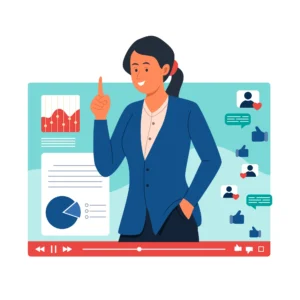
Top benefits of video interviewing
The interviewing process includes several steps, be it going through resumes, calling candidates, and in-person interviews or skill assessment tests. The various steps with multiple applicants take a lot of time. Most of the time involves repeating the same steps with all shortlisted candidates. This is where video interviewing processes come in handy. Instead of calling ten applicants and asking them the same questions, video interviewing software saves time. We will be discussing the different types and benefits of video interviewing software.
Types of Video Interviewing?
Video interviewing consists of using online software to ask questions to applicants and record their answers for reviews and ratings. There are two common ways that most hiring managers conduct video interviews. First, there are one-way video interviewing platforms like Ducknowl, there are live video calling systems like Zoom, Webex, and Skype.
1. One-Way Video Interviews
One-way video interviews or asynchronous video interviews involve sending the same pre-chosen questions to all candidates. They receive the invitation and record their answers to each question. Typically, you can set a time limit for each question. For example, with Ducknowl, you can choose to limit the answer time for the candidate to two minutes for a specific question. Once candidates record their answers, recruiters will be notified of the interview completion. Candidate responses can be viewed at the recruiter’s convenience. They also will be able to share all responses with hiring managers and other members of their team for feedback.
2. Two-Way Video Interviews

A two-way video interview is live, taking place via video calling apps such as Skype, Zoom, or Webex. Like your standard in-person interviews in virtual interviews, the interviewers come prepared with a list of questions to ask the candidates. In this, the interview takes place face to face on camera via video interviewing software.
How does a video interview process work?
Although the number of additional features to make a video interview smooth may vary from one application to another, the basic process stays the same. Employers can either interview their candidates through a one way video interview software or go with a live video meeting process. Several companies also follow both processes to get a much more detailed look at their candidate’s profiles.
So, how do these two methods work?
1. One-way interviewing session
As the name suggests, only the candidates are required to answer questions arranged by the employers in this procedure. Typically the first step to the whole ordeal, the arrangement can be both textual or video-based, where the clip will start running automatically at time intervals, allowing candidates to answer them in the meantime.
Unlike traditional hiring processes, it minimizes biased behavior and ensures that employers can better understand their potential future employees. Nowadays, many major companies follow this process to streamline the hiring process while also making sure that their HR team ends up with more time to focus on other essential tasks.
2. Live interviewing
Finally, a live interview session is held where both the employer and candidate engage in a series of questionnaires. While business owners or the HR team can hold discussions regarding the true interests of the individual, candidates can also have their doubts cleared. This type of arrangement, often done using a webcam, reduces the unnecessary expense related to traveling or hosting interview walk-ins.
Moreover, some companies also record these interview sessions for review later or just as a precautionary measure. While major businesses run this interview as a final step in their hiring process, some might also ask for a last in-person interview just to be extra sure of their choice.
Benefits of Video Interviewing
1. Reduce the time it takes to hire
This is the biggest benefit when utilizing video interviews in your hiring process. It can replace the phone or in-person interviews. For phone interviews, recruiters spend a lot of time trying to coordinate a mutual time and date that works for them and their candidates and often have to deal with last-minute scheduling conflicts. They spend time preparing and repeating the same questions with each candidate. For in-person interviews, the recruiter has to set aside time for each candidate’s visit. Not only does the interview itself take a substantial amount of time to conduct, but recruiters often dedicate extra time to make their experience pleasant by welcoming the candidate, offering refreshments, and escorting them around the office. All these activities require a tremendous amount of time and energy.
With one-way video interviews, all you have to do is customize the interview questions and send invitations to all applicants. Candidates will then record their answers at their own convenience and you can review the response whenever you have time.
2. Give more insight
A phone interview does not give you enough insight into a candidate’s soft skills. You are talking with the candidate on the phone, you can only hear their voice but can’t see their body language or facial expressions. Video interviewing allows the recruiter to get a glance at the candidate’s personality which is very important to accurately understand when making hiring decisions.
3. Create a Uniform Interviewing Process
Employers can ensure that recruiters are utilizing the same interview process with all applicants for all jobs. With video interviewing, all candidates are asked the same questions, given the same amount of response time, and are reviewed by the same team.
With Ducknowl, recruiters get a dashboard where they can compare all candidates and their video responses. Video interviewing helps you to develop a standard company-wide interviewing process.
4. Share Results
Effectively sharing the results of a phone interview is not an easy task. Recruiters have to multitask and take notes during the interview to discuss with hiring managers at a later time. Not only is that time-consuming, but oftentimes hiring managers miss out on important pieces of information about candidates. All of this is avoided with video interviewing.
Video interviewing platforms contain tools that allow recruiters to easily share interview responses with hiring managers and other members of their team via email. Hiring managers can quickly view responses from their web browser and include comments and ratings for each candidate.
5. Eliminate Bias
Video interviewing software records all data digitally, and you can log in to a dashboard to see all applicants and their resumes with ratings. There is not much room for personal biases, you are asking the same set of questions and rating each of them on the same parameters. With a traditional phone or in-person interview, there are more chances of bias by recruiters since recruiters are just taking notes. When the interview is digital, the bias is minimized.
6. Reduce the burden of scheduling
During the recruitment process, it can be very time-consuming. You may find yourself emailing each candidate multiple times per day. You may even find it challenging to schedule a time that works best for each person. This means creating an interview schedule can take on the appearance of a Tetris puzzle. A video interview will greatly simplify the scheduling process. You will discover that you can interview hundreds of candidates in a matter of days.
7. Shortens the Phone Screening Process
A pre-recorded interview cuts down on the time it takes to screen each candidate over the phone. It allows you to determine whether a candidate would be a good fit for your company. Best of all, you can easily create one way video interview questions that will assist you in making an informed decision about the best candidate for your company.
Read More: Why do candidates really like video interviews?
8. Reduces Cost
If you want to interview a candidate who lives in another location, you can invite them to participate. There’s no reason to incur additional costs just to get a sense of what they’re all about. Following the interview, you will be able to determine whether an in-person interview is more feasible or necessary.
5. Examine the candidate’s capability to use technology
In this digitized world, It is critical to understand whether or not the candidate is technologically savvy. With video interviewing, candidates need to use their computers and software properly. This allows recruiters to quickly assess a candidate’s level of familiarity with technology. For example, if a candidate is not able to record the audio properly, the video is blurry, or the candidate is doing several retakes, you can assess that the candidate is not very tech-savvy. It will assist you in determining whether the person is the best fit for the job, especially if the job requirements are technological.
6. Build a better and standardized screening of candidates
Video interviews provide a better first-round structured screening. In phone screening, sometimes recruiters may change some of the questions by mistake or forget to ask all the questions. Also, recruiters may not be able to record the answers in detail. Recruiters can lose things in translation from the candidate to the recruiter or from the recruiter to the hiring manager. With video interviewing, this problem is resolved since all the answers are recorded and all the questions are well-defined. This also allows hiring managers to make data-driven decisions as you can compare candidate responses side by side.
7. No location restrictions
When you implement video interviewing software, the process will make it easy to connect you with potential employees who can work remotely or those who live in other areas interested in relocating. Knocking these barriers down, in addition to time zone conflicts with one-way interviews, opens your company up to a much larger talent pool.
8. Eliminates in-person interview stress
Job interviewing can be anxiety-filled for many people. The high level of anxiety around interviewing can make it challenging to communicate clearly in the interview and even sabotage the candidate’s chances of landing the job. Virtual interviewing eliminates unnecessary added stress like picking out the right attire, getting stuck in traffic, finding parking, or potentially spilling coffee on themselves during the interview. Interviewing virtually enables candidates to interview from a comfortable space and bring their best foot forward.
9. Access communication skills
Some positions require candidates to have strong people skills, which puts one’s body language and communication at the top of the list of most desirable traits. The good news is that both can be analyzed through a simple video interview nearly as effectively as during an in-person video. The company can capture the essence of every candidate – the way they talk, dress, present their ideas, and decide whether they would be a right fit for the company or not.
How is video interviewing beneficial to ramp up the hiring process?

With the growing cut-throat competition to find the best manpower for a job, it has become one of the most tedious and impossible tasks to shortlist potential candidates for the final round, that too within a limited time. The recruiter team has to go through hundreds of applications every day just to find that one perfect candidate for the job.
With the advent of advanced video interviewing processes, there has been tremendous growth in the overall hiring process.
It helps as follows:
-
- Faster and more efficient screening of resumes
- Better chances of gaining insight into the true capabilities and pain points of the individual
- Reduced financial constraints on the company
- Zero geographic constraints
- Allows more transparency for both the employers and candidates when checking their performance
- Ensures better time management for the employers
However, knowing about the benefits would not help you make the best use of this technology. You must also know how a video interviewing process works to understand your responsibilities around feeding it with the right information.
Where to find the perfect software for video interviewing?
Among the many reliable applications, it has been able to climb the ladders of success pretty quickly, all thanks to its advanced video interviewing tools. Equipped with highly intelligent features, the tool is capable of enabling video interviews of high quality with an auto-record function for easy maneuverability. But that’s not all!
Authorized individuals can easily share and access these pre-recorded video interviews at any time from anywhere, making the hiring process even more efficient.





